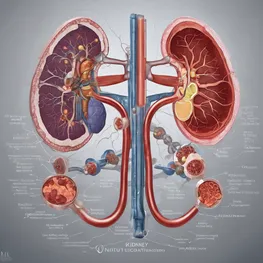Table of contents
- The Connection Between Diabetes and Vision Issues
- Managing Blood Sugar to Preserve Vision
- The Power of Healthy Eating for Eyesight and Blood Sugar Regulation
- Managing Diabetes and Protecting Your Vision: The Key to a Healthy Lifestyle
- Proven Techniques for Promoting Healthy Vision in Diabetic Individuals
Diabetes and vision health are closely intertwined, with the former posing significant risks to the latter. In this article, we will explore the intricate relationship between diabetes and vision, discussing how diabetes can affect eyesight and what individuals can do to protect their vision while managing their diabetes effectively. From the impact of high blood sugar levels to the risk of diabetic retinopathy, join us as we delve into the important topic of diabetes and its implications for eye health.
The Connection Between Diabetes and Vision Issues
Diabetes is a chronic condition that affects how the body processes glucose, resulting in high blood sugar levels. While diabetes has numerous health implications, one significant area that it impacts is vision. The development of various vision problems becomes more likely in individuals with diabetes due to several interrelated factors.
-
1. Diabetic Retinopathy
Diabetic retinopathy is a condition that occurs when high blood sugar levels damage the blood vessels in the retina. Over time, this damage can lead to vision impairment and even blindness if left untreated.
-
2. Cataracts
Cataracts are opacities in the lens of the eye, resulting in clouded vision. People with diabetes have a higher risk of developing cataracts and tend to develop them at an earlier age compared to those without diabetes.
-
3. Glaucoma
Diabetes increases the risk of developing glaucoma, a condition characterized by increased pressure within the eye. If left untreated, glaucoma can cause peripheral vision loss and, in severe cases, permanent blindness.
-
4. Diabetic Macular Edema
Diabetic macular edema occurs when fluid accumulates in the macula, the central portion of the retina responsible for sharp central vision. This condition can lead to distorted and blurred vision, severely impacting daily activities.
-
5. Reduced Tear Production
People with diabetes may experience reduced tear production, leading to dry eyes. Dry eyes can cause discomfort, irritation, and an increased risk of eye infections and corneal damage.
-
6. Nerve Damage
Diabetes can cause nerve damage or diabetic neuropathy, affecting the nerves that control the eyes. This can result in various vision problems, including double vision, difficulty focusing, and problems with eye movement.
Managing Blood Sugar to Preserve Vision
Maintaining good vision health is crucial for overall well-being. One crucial aspect of preserving vision health is managing blood sugar levels effectively. Research has shown a significant link between blood sugar control and maintaining good vision. Let's explore this connection in more detail.
- High blood sugar levels can cause damage to the blood vessels in the retina, leading to a condition called diabetic retinopathy. Diabetic retinopathy is the leading cause of blindness in adults.
- Uncontrolled blood sugar levels can also increase the risk of developing other eye conditions, such as cataracts and glaucoma.
- Consistently high blood sugar can lead to swelling of the lens in the eye, leading to blurry vision and difficulty focusing.
- Poor blood sugar control can also contribute to the development of macular edema, a condition characterized by fluid accumulation in the macula, which can result in vision loss.
- Proper blood sugar management through lifestyle modifications, medication, and regular monitoring can significantly reduce the risk of vision complications.
- Maintaining a healthy diet, engaging in regular physical activity, and taking prescribed medication as directed are crucial for blood sugar control and overall vision health.
- Regular eye examinations are essential for individuals with diabetes to detect any potential eye problems early on and intervene before they progress.
- By effectively managing blood sugar levels, individuals can protect their vision and reduce the risk of vision-related complications.
The Power of Healthy Eating for Eyesight and Blood Sugar Regulation
Maintaining a healthy diet not only benefits overall well-being but also plays a crucial role in regulating blood sugar and preserving vision health. The connection between a nutritious eating plan and these two aspects cannot be understated. By making mindful food choices, individuals can effectively manage their blood sugar levels and maintain optimal eye function.
-
Blood Sugar Management
A healthy diet, rich in whole grains, fruits, vegetables, and lean proteins, is essential for individuals with diabetes or those at risk of developing the condition. Consuming balanced meals that consist of complex carbohydrates, fiber, and lean proteins helps regulate blood sugar levels and prevent spikes. Foods with a low glycemic index, such as leafy greens, berries, and legumes, provide a steady release of glucose, preventing sudden blood sugar fluctuations. Moreover, reducing sugar and refined carbohydrate intake can improve insulin sensitivity, reducing the risk of diabetes and aiding in blood sugar control.
-
Vision Health
Nutrition plays an integral role in maintaining healthy eyesight. Consuming a variety of fruits and vegetables promotes eye health due to their high antioxidant content. Antioxidants, such as vitamin C, vitamin E, and beta-carotene, help protect the eyes from oxidative stress and age-related macular degeneration. Additionally, omega-3 fatty acids found in oily fish like salmon and mackerel contribute to optimal eye function. These fatty acids may help prevent dry eyes and macular degeneration. Including foods rich in vitamins A, C, E, zinc, and lutein can significantly reduce the risk of developing common eye conditions and maintain clear vision.
Managing Diabetes and Protecting Your Vision: The Key to a Healthy Lifestyle
Maintaining good vision health is crucial for individuals with diabetes. Fortunately, there are several lifestyle modifications that can help individuals with diabetes protect and improve their vision. These modifications include:
- Controlling blood sugar levels: Keeping blood sugar levels within a target range is essential for preventing or slowing down the progression of diabetic eye diseases. Regular monitoring and adjustment of medication or insulin can help maintain stable blood sugar levels.
- Eating a balanced diet: A healthy diet rich in fruits, vegetables, whole grains, and lean proteins can provide the necessary nutrients to support eye health. Consuming foods high in omega-3 fatty acids, such as fatty fish, can also be beneficial.
- Maintaining a healthy weight: Losing excess weight and maintaining a healthy weight can help reduce the risk of developing vision problems associated with diabetes. Regular exercise and portion control can aid in weight management.
- Quitting smoking: Smoking can increase the risk of diabetic retinopathy and other eye conditions. Quitting smoking can significantly improve overall eye health and reduce the likelihood of developing vision complications.
- Regular eye exams: Routine eye exams are crucial for individuals with diabetes. These exams help detect any early signs of diabetic eye diseases and allow for timely intervention. It is recommended to have a comprehensive eye exam at least once a year.
- Protecting the eyes: Wearing sunglasses that block ultraviolet (UV) rays and avoiding prolonged exposure to sunlight can reduce the risk of developing cataracts and other eye conditions. Additionally, using protective eyewear during physical activities or work can prevent eye injuries.
When it comes to protecting vision and managing diabetes, healthcare professionals offer valuable advice. Regular eye exams are crucial to detect any early signs of diabetic eye diseases. Maintaining healthy blood sugar levels through diet, exercise, and medication is essential. Quitting smoking and managing blood pressure are also recommended. Protecting the eyes from harmful UV rays with sunglasses and using computer screens at a safe distance can help prevent vision problems. Following these proven techniques can promote healthy vision in individuals with diabetes.
In conclusion, it is clear that there is a strong relationship between diabetes and vision health. People with diabetes are at a higher risk of developing eye conditions such as diabetic retinopathy, cataracts, and glaucoma. Regular eye examinations, blood sugar control, and early detection are crucial in preserving vision and preventing further complications. It is essential for individuals with diabetes to work closely with healthcare professionals and take proactive measures to protect their vision. With proper management and care, the impact of diabetes on vision health can be minimized, leading to better overall quality of life.
Frequently asked questions related to diabetes and vision loss
How does diabetes affect vision health?
Diabetes can cause a condition called diabetic retinopathy, which damages the blood vessels in the retina. This can lead to vision loss and blindness if left untreated.
What are the symptoms of diabetic retinopathy?
Some common symptoms of diabetic retinopathy include blurry or distorted vision, floaters, dark spots or empty areas in your vision, and difficulty seeing at night.
Are there any treatment options for diabetic retinopathy?
Treatment options for diabetic retinopathy may include laser surgery to seal leaking blood vessels, injections of medications into the eye, and vitrectomy surgery to remove blood from the center of the eye.
Can diabetes be a cause of cataracts?
Yes, diabetes can increase the risk of developing cataracts. Cataracts occur when the lens of the eye becomes clouded, leading to blurred vision and eventual vision loss.
How can people with diabetes protect their vision?
Managing blood sugar levels, controlling blood pressure and cholesterol, quitting smoking, getting regular eye exams, and maintaining a healthy lifestyle can all help protect vision for individuals with diabetes.







